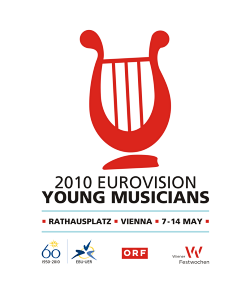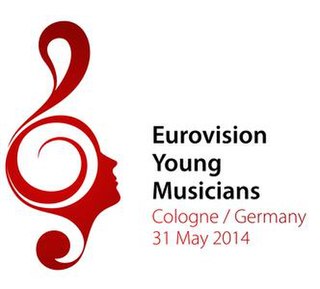
Eurovision Young Musicians, often shortened to EYM, or Young Musicians, is a biennial classical music competition for musicians aged between 12 and 21. It is organised by the European Broadcasting Union (EBU) between members of the union, who participate representing their countries. Some participating broadcasters hold national selections to choose its representative for the contest.

The Eurovision Young Musicians 1994 was the seventh edition of the Eurovision Young Musicians, held at the Philharmonic Concert Hall in Warsaw, Poland, between 9 and 14 June 1994. Organised by the European Broadcasting Union (EBU) and host broadcaster Telewizja Polska (TVP), musicians from eight countries participated in the televised final. A total of twenty-four countries took part in the competition therefore a semi-final was held in the same venue on 9 and 10 June 1994. Out of the 24 countries, 16 did not qualify to the final, including the host country Poland. All participants performed a classical piece of their choice accompanied by the Warsaw Symphony Orchestra, conducted by Kazimierz Kord.

The Eurovision Young Musicians 2008 was the fourteenth edition of the Eurovision Young Musicians, held at the Rathausplatz in Vienna, Austria, on 9 May 2008. Organised by the European Broadcasting Union (EBU) and host broadcaster Österreichischer Rundfunk (ORF), musicians from seven countries participated in the televised final. This was the second time that the competition was held on an open-air stage and was the beginning of the annual Vienna Festival. Austria and broadcaster ORF previously hosted the contest in 1990, 1998 and 2006.

The Eurovision Young Musicians 2010 was the fifteenth edition of the Eurovision Young Musicians, held at the Rathausplatz in Vienna, Austria, on 14 May 2010. Organised by the European Broadcasting Union (EBU) and host broadcaster Österreichischer Rundfunk (ORF), musicians from seven countries participated in the televised final. This was the third time that the competition was held on an open-air stage and was the beginning of the annual Vienna Festival. Austria and broadcaster ORF previously hosted the contest in 1990, 1998, 2006 and 2008.

The Eurovision Young Musicians 2012 was the sixteenth edition of the Eurovision Young Musicians, held at the Rathausplatz in Vienna, Austria, on 11 May 2012. Organised by the European Broadcasting Union (EBU) and host broadcaster Österreichischer Rundfunk (ORF), musicians from seven countries participated in the televised final. This was the fourth time that the competition was held on an open-air stage and during the annual Vienna Festival. Austria and broadcaster ORF previously hosted the contest in 1990, 1998, 2006, 2008 and 2010.

The Eurovision Young Musicians 2014 was the seventeenth edition of the Eurovision Young Musicians, held outside the Cologne Cathedral in Cologne, Germany, on 31 May 2014. Organised by the European Broadcasting Union (EBU) and host broadcaster Westdeutscher Rundfunk (WDR), musicians from fourteen countries participated in the televised final. This was the fifth time that the competition was held on an open-air stage. Germany previously hosted the contest in 2002.

Austria has participated in the biennial classical music competition Eurovision Young Musicians 19 times since its debut in 1982 and is the most successful country in the contest, with a total of six wins. Austria has hosted the contest a record six times, in 1990, 1998, 2006, 2008, 2010, and 2012.

Croatia has participated in the biennial classical music competition Eurovision Young Musicians 14 times since its debut in 1994.

The United Kingdom has participated in the biennial classical music competition Eurovision Young Musicians sixteen times since its debut in 1982. The British participant broadcaster in the contest is the British Broadcasting Corporation (BBC). They hosted the inaugural contest in 1982 and won the contest in 1994. They returned to the contest in 2018 after a 8-year absence as hosts, but did not return for the next editions in 2022 or 2024.

Sweden has participated in the biennial classical music competition Eurovision Young Musicians 15 times since its debut in 1986, winning the contest for the first time in 2006. Sweden are yet to host the contest.

The Czech Republic has participated in the biennial classical music competition Eurovision Young Musicians ten times since its debut in 2000, winning the contest for the first time in 2022.

Slovenia has participated in the biennial classical music competition Eurovision Young Musicians 13 times since its debut in 1994, winning the contest for the first time in 2010.

France has participated in the biennial classical music competition Eurovision Young Musicians eleven times since its debut in 1982. France won the contest in 1986, and hosted the 2022 edition in Montpellier.

Spain has participated in the biennial classical music competition Eurovision Young Musicians eight times since its debut in 1988, most recently taking part in 2018, after a 16-year absence. The country's best result was a second-place finish in 1992, the only time in which they qualified for the televised final.

Belgium has participated in the biennial classical music competition Eurovision Young Musicians 11 times since its debut in 1986, most recently taking part in 2024. The country's best result is two third-place finishes, in 1990 and 1992; two of only four years in which the country has qualified for the televised final. Belgium hosted the contest in 1992.

The Eurovision Young Musicians 2016 was the eighteenth edition of the Eurovision Young Musicians contest, which took place on 3 September 2016, outside the Cologne Cathedral, in Cologne, Germany. For a second consecutive time, German public broadcaster Westdeutscher Rundfunk (WDR) was the host broadcaster for the event, with Daniel Hope and Tamina Kallert being the presenters for the show. Musicians representing eleven countries with European Broadcasting Union (EBU) membership, participated in the contest, with San Marino making their debut, while Greece, Moldova, Netherlands, and Portugal decided not to participate in this edition. The candidates were accompanied by the WDR Symphony Orchestra Cologne, conducted by Clemens Schuldt. A five-person jury decided which of the participants would be awarded with the top-three prizes. Łukasz Dyczko of Poland won the contest, with Czech Republic and Austria placing second and third respectively.

The Eurovision Young Musicians 2018 was the 19th edition of the Eurovision Young Musicians contest. This edition was a co-production between the European Broadcasting Union (EBU), the Edinburgh International Festival, and the British Broadcasting Corporation (BBC) as host broadcaster. It was hosted in the United Kingdom, for the first time since the inaugural contest in 1982. Musicians representing eighteen countries participated in the contest, with Albania making their debut alongside seven returning countries, while Austria decided not to participate for the first time.




















